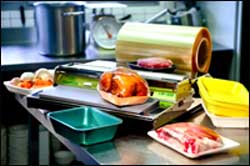LINPAC stretch film name changed from Zenit to Zenium

LINPAC’s new Zenit line of multi-layer stretch films is undergoing a name change and will, from now on, be called Zenium. Zenium stretch films, which were released earlier this year, are formulated to comply with new EU regulations concerning plastic materials that come into contact with food products.
High resistance to perforation and tearing and optimal flexibility are the major advantages of the Zenium line, which also offers excellent optical properties and increased anti-fogging power. The edges of the rolls are trimmed to ensure perfect unwinding. Films may be delivered neutral or printed with a slogan, logo, or bar-code, in individually packaged rolls or in bulk on pallets. Reducing the volume of packaging materials used at source enables packagers to minimize the amount of waste produced, as mandated by European Directive 2004/12/CE of the European Union.
The Zenium films, which are intended for industrial agribusinesses, poulterers, slaughterhouses, packing centres and supermarket chains, were designed to wrap meat, fruit, vegetables, fish and cheese. Zenium films are ideal for all tray sizes and can be used for manual and machine packaging, including intensive high-speed packaging and packaging for high-volume or sharp products (smoked chicken or rib steak, for example).
Media Contact
All latest news from the category: Materials Sciences
Materials management deals with the research, development, manufacturing and processing of raw and industrial materials. Key aspects here are biological and medical issues, which play an increasingly important role in this field.
innovations-report offers in-depth articles related to the development and application of materials and the structure and properties of new materials.
Newest articles

High-energy-density aqueous battery based on halogen multi-electron transfer
Traditional non-aqueous lithium-ion batteries have a high energy density, but their safety is compromised due to the flammable organic electrolytes they utilize. Aqueous batteries use water as the solvent for…

First-ever combined heart pump and pig kidney transplant
…gives new hope to patient with terminal illness. Surgeons at NYU Langone Health performed the first-ever combined mechanical heart pump and gene-edited pig kidney transplant surgery in a 54-year-old woman…

Biophysics: Testing how well biomarkers work
LMU researchers have developed a method to determine how reliably target proteins can be labeled using super-resolution fluorescence microscopy. Modern microscopy techniques make it possible to examine the inner workings…





















